The competitions that are listed here will form the third portion of medal events at the 2024 International Geography Championships in addition to buzzer-based quiz competitions and exams. These twelve events are an engaging and challenging group of all sorts of geography-themed competitions. Further information will be forthcoming on these events in the coming months; if you have any questions, please contact david@iacompetitions.com. We look forward to your participation in these events at IGC 2024 next July!
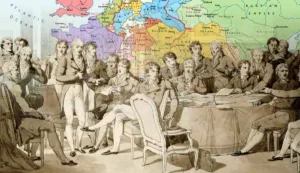 Competing Students and Country Assignments for the Congress of Vienna Simulation
Competing Students and Country Assignments for the Congress of Vienna Simulation
One of the greatest international conferences in world history took place over 200 years ago at the Congress of Vienna when delegates from numerous European countries came together to determine the future of Europe in the aftermath of the Napoleonic Wars. At the 2024 International Geography Championships, students in the High School, Middle School, and Intermediate Divisions will have a chance to simulate this exercise in political geography and diplomacy. Over the course of a private dinner at a traditional Viennese restaurant, students will represent a country and defend its interest in a simulation of the Congress of Vienna. Period dress is actively encouraged!
This competition is by application only and is limited to 15-17 students per age division. Applicants should ideally have prior simulation experience (e.g. Model UN, the Historical Simulation at the 2023 International History Olympiad) and/or have demonstrated a proficient knowledge of European geography and history through performance in prior IAC competitions (including the National or International Geography Bee and the National or International History Bowl, or through Championship Exam results). Applications will be accepted once IGC 2024 event selection opens in early 2024. Note that certain optional events on the schedule may conflict with a particular age division’s evening of this simulation. Students who compete in the Congress of Vienna Simulation will therefore not be able to take part in the overlapping events. Students will be notified of their participation status (as well as their country of representation if selected) at the end of June 2024, and will have 2-3 weeks to prepare in advance.
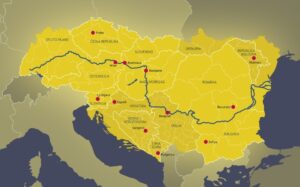 At each International Geography Championships and International History Olympiad, The Great Trading Game is one of the most eagerly anticipated optional competitions. At IGC 2024, Jay Wickliff, Great Trading Game inventor and IAC veteran staff member presents this year’s variant: The Great Danube Trading Game!
At each International Geography Championships and International History Olympiad, The Great Trading Game is one of the most eagerly anticipated optional competitions. At IGC 2024, Jay Wickliff, Great Trading Game inventor and IAC veteran staff member presents this year’s variant: The Great Danube Trading Game!
Note: For the Middle School & Intermediate Divisions, two sets of medals will be awarded. Students in these divisions will only compete against other students in their grade (or grade equivalent; e.g. 8th grade = students outside North America born between Sep. 1, 2009 and Aug. 1, 2010).
The Danube Trading Game is a fun and interactive experience that emerges players into the economies of eight European Countries along the Danube River. River systems are among the most critical geographic features of Europe and the Danube has always been an important means of transport for commerce. Six of these countries – Austria, Slovakia, Hungary, Germany, Bulgaria, and Romania – are members of the European Union, which has facilitated increased trade among its members. Ukraine and Serbia have been identified as potential candidates for membership, which often results in reduced trade barriers. Much of Central European trade is shipped on the Danube extending from Black Forest mountains of western Germany to its mouth on the Black Sea. The game oversimplifies the countries’ economies in many ways. The four countries, whose capitals are located on the Danube, and four other countries with major ports on the river are represented only as caricatures of their complex cultures and economies. Moreover, the timeline is condensed, and the game focuses on a few commodities. Nevertheless, the game demonstrates the interdependence of the Danube Basin economies. It will give players a sense of the challenges facing these countries.
Players will deal with the twists and turns of the international economy, while exercising and expanding their diplomatic, tactical, and negotiating skills. Knowledge of global maritime geography, strategy and a bit of luck will also play a role in determining the winner of The Great Danube Trading Game!
 Geographeud returns to the IGC event line up for 2024 for all age divisions!. This required team event sees two teams compete against each other in a competition reminiscent of the American game show Family Feud. In Geographeud, we ask teams to name one of the top five (or six, or seven, etc.) of a geographical category. For example “Excluding Brazil and Portugal, name the top five countries with the most Portuguese speakers.” Or, “Name the top six lakes by volume in the world.” Teams send up one of their players to buzz in on an initial guess – whoever gets the higher value controls the board (or can elect to pass). We then continue with the other team members, though once a team gets three strikes, the other team then can win the round by naming one of the remaining answers the first team missed. Of course if the first team gets all entries before getting three strikes, then they win. The twist is that teams get more points if they name one of the smallest values (e.g. the sixth highest lake by volume gets one point, while the highest lake by volume gets only one point). This rewards teams who can use their geography skills to make educated guesses – unless they know it outright!
Geographeud returns to the IGC event line up for 2024 for all age divisions!. This required team event sees two teams compete against each other in a competition reminiscent of the American game show Family Feud. In Geographeud, we ask teams to name one of the top five (or six, or seven, etc.) of a geographical category. For example “Excluding Brazil and Portugal, name the top five countries with the most Portuguese speakers.” Or, “Name the top six lakes by volume in the world.” Teams send up one of their players to buzz in on an initial guess – whoever gets the higher value controls the board (or can elect to pass). We then continue with the other team members, though once a team gets three strikes, the other team then can win the round by naming one of the remaining answers the first team missed. Of course if the first team gets all entries before getting three strikes, then they win. The twist is that teams get more points if they name one of the smallest values (e.g. the sixth highest lake by volume gets one point, while the highest lake by volume gets only one point). This rewards teams who can use their geography skills to make educated guesses – unless they know it outright!
Teams will likely play 3 preliminary rounds, with the top 4 teams in each age division advancing to the semifinals and finals.
Game Rules
 Many geographically savvy students have enjoyed the Geoguessr game since it debuted online in 2013. At IGC, participants play a modified version of it; the 2022 competition pictures and their answers are listed below. In 2024, the rules will be similar in this optional competition for all age divisions. Note that the images will be shown on a television, screen in the room we are in, or a staff laptop: there is no need to have an actual Geoguessr subscription nor to bring your own laptop or mobile phone.
Many geographically savvy students have enjoyed the Geoguessr game since it debuted online in 2013. At IGC, participants play a modified version of it; the 2022 competition pictures and their answers are listed below. In 2024, the rules will be similar in this optional competition for all age divisions. Note that the images will be shown on a television, screen in the room we are in, or a staff laptop: there is no need to have an actual Geoguessr subscription nor to bring your own laptop or mobile phone.
International Geography Championships – Geoguessr Official Rules
Elementary Geoguessr Pictures
Middle School Geoguessr Pictures
High School Geoguessr Pictures
Answers – All Divisions
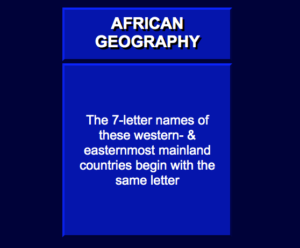 Geopardy, as its name suggests, is a game based on the popular quiz show Jeopardy! with a number of adjustments so that we can make it a competition event for IGC. Up to 5 students compete at a time, selecting clues of varying values and difficulty from a grid of categories (all of which, of course, will have geographic themes). Students will not be able to ring in until the moderator has finished reading each question. If a student answers correctly, they get the points, and pick the next question. Students will play one full game, with the top students in each age divisions making the semifinals, and then the top players in the semis will play in the finals.
Geopardy, as its name suggests, is a game based on the popular quiz show Jeopardy! with a number of adjustments so that we can make it a competition event for IGC. Up to 5 students compete at a time, selecting clues of varying values and difficulty from a grid of categories (all of which, of course, will have geographic themes). Students will not be able to ring in until the moderator has finished reading each question. If a student answers correctly, they get the points, and pick the next question. Students will play one full game, with the top students in each age divisions making the semifinals, and then the top players in the semis will play in the finals.
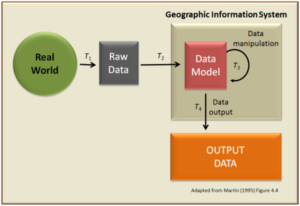 This event is for High School Division students only. This event counts 1/3 towards the individual IGC Championship Title for High School Division students.
This event is for High School Division students only. This event counts 1/3 towards the individual IGC Championship Title for High School Division students.
Geographic Information Systems, or GIS, have become a critically important tool within the discipline of geography. As geographers have grown increasingly accustomed to using GIS in their work, it’s important that students looking to study geography in their university studies and careers gain a working understanding of GIS. For High School Division students only, the GIS competition is a required portion of the competition at the International Geography Championships.
The GIS Exam from 2022 and its Grading Guidelines are listed here for review. For IGC 2024, we will introduce a new set of GIS problem or problems. Further information may be posted on this page in advance of July 2024. Good luck!
2022 International Geography Championships – GIS Exam
2022 International Geography Championships – GIS Grading Guidelines
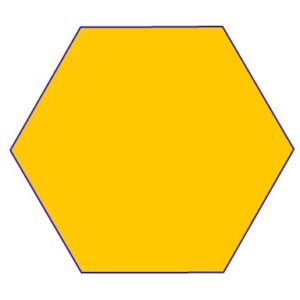 Competition Type: Team, 6 different events
Competition Type: Team, 6 different events
This is a required event for all competing students.
The Hextathlon (sometimes spelled Hexathlon; both versions are considered correct) is a collaborative team event where team members will work together to come up with correct answers on 6 different types of quizzes, including the following:
1. Crossword Puzzle Quiz
2. 3-2-1 Quiz
Teams will hear questions audibly and have the chance to submit an answer off a difficult clue for 3 points, a moderate clue for 2 points, or an easy clue for 1 point. Clues will be read in 3-2-1 order, with teams having an opportunity to submit an answer before the next clue is read. Teams can only submit 1 answer per question, however (i.e. you cannot submit an answer after each clue, or go back and change your answer upon hearing a later clue)
3. Multiple Choice Quiz
4. Map Quiz
5. Audio Quiz
6. Picture Quiz
There will be a limited amount of time for each version of the quiz (likely 12-15 minutes for each step), and each quiz will be worth the same amount in the overall score.
Knockout is a competition unique to the International Geography Championships, International History Olympiad, and International Environmental Science Olympiad.* Up to 15 players sit or stand in a circle. One player begins, and then selects another player – that player then has to answer a question correctly. If they don’t, they get a strike. If they answer correctly, then they get the chance to pick the next player. If you get a certain number of strikes, then you’re out! The top players move on to additional rounds. At the end of the rounds, the last players to get knocked out receive bronze and silver medals, and the sole survivor is the gold medalist. See the official rules and scoresheet for further details.
Knockout – Official Rules
Knockout – Official Scoresheet
* IGC trivia note – The idea for this event comes from Jeder Gegen Jeden (translation: Each Against Everyone) – a German language TV quiz show. If you’re interested in seeing an episode of Jeder Gegen Jeden, click here. Even if you don’t speak German, you can probably get the gist of the show – and if you listen carefully, you may even be able to figure out a few of the questions and answers.
 Competing Students and Country Assignments for the OPEC Simulation
Competing Students and Country Assignments for the OPEC Simulation
OPEC (the Organization of the Petroleum Exporting Countries) is headquartered in Vienna, Austria. Chosen for its political stability, neutrality, and lack of its own oil production, Austria is perhaps a curious choice for OPEC Headquarters, but this gives us an opportunity to examine and simulate its activities at the 2024 International Geography Championships. Schedule permitting (which can change due to political events and general availability), students will first visit OPEC headquarters and have a chance to meet with representatives from OPEC and/or the oil and financial industries. They will then participate in a competitive simulation, where each competing student will represent an OPEC country and need to act in its best interests.
Participation in this competition is limited to High School Division students and is by application only. The application period will open in Spring 2024 when event selection for IGC 2024 becomes available. Participating students should ideally have some experience in simulation activities (e.g. Stock Market Game, Model UN) and/or have completed some coursework in economics. This activity is limited to 12 students.
 This event is for High School Division Students Only
This event is for High School Division Students Only
For the 2024 International Geography Championships, the Symposium offers students a chance to present their own research. First, students will write a 2000-3500 word geographic-themed research paper (there is no specific focus that the paper will need to take) on a topic of their choice. The research paper must be entirely original, though it is permitted for students to submit a relevant paper that they have previously written as part of their academic studies in school or homeschooling. Papers must be formatted to include proper footnotes and a bibliography and should include a wide variety of sources. Any evidence of plagiarism will lead to immediate disqualification.
Students’ papers will be due on July 9, 2024, and will then be read by IGC staff. The top students will then be subject to an oral defense of their research by their readers. From those, the top three students, as selected by the readers will be invited to a dinner with IGC staff members at a traditional restaurant in Vienna where they will have a chance to share their research with each other as well.
Note: You are welcome to use whichever citation format you prefer, although you must cite sources. Footnotes are preferred over endnotes, if you are using footnotes. You are also welcome to use MLA format (whereby, you would just indicate the author’s name [and work if citing more than one source by the same author] in parentheses, followed by the relevant page number). For all papers, a bibliography must be included, and a wide variety of sources (especially primary sources and interviews) is encouraged.
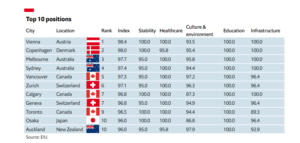 Competing Students and City Assignments for the Task Force on Urban Planning
Competing Students and City Assignments for the Task Force on Urban Planning
Vienna is frequently ranked as being the World’s Most Livable City. By Day 6 of IGC 2024, when the Task Force on Urban Planning convenes, you’ll have had a first-hand opportunity to see why. In this optional competition that is open only to students in the Middle School, Intermediate, and Elementary School Divisions (the mandatory GIS Competition for the High School Division takes place simultaneously), you’ll be a delegate from a different city sent to learn what makes Vienna so great, and how it can be made even better.
The premise of the Task Force is that each competing student will be assigned a different global city roughly two weeks in advance of IGC. They will then need to do some basic research on this city, and draft a one-page memorandum in advance of IGC with points on both what Vienna can learn from their city, and what their city can learn from Vienna. Students will then collaboratively draft a paper during the first 2.25 hours on what Vienna could do even better, both from what they have learned through their personal experiences of Vienna, through the Task Force activities, and from their research on their home city. Finally, during the final 15 minutes, they will then answer several questions in a report for their home cities on what their specific cities should learn from Vienna. Students will be judged on their ability to bring creative ideas to the Task Force, their collaboration with their peers, their contributions to the final Task Force report for the Viennese City government, and their ideas on their final report for their home city. Residents of Vienna and representatives from its varies business and government sectors will join us at various points so that students can learn firsthand from people who live and work in the IGC 2024 host city.

